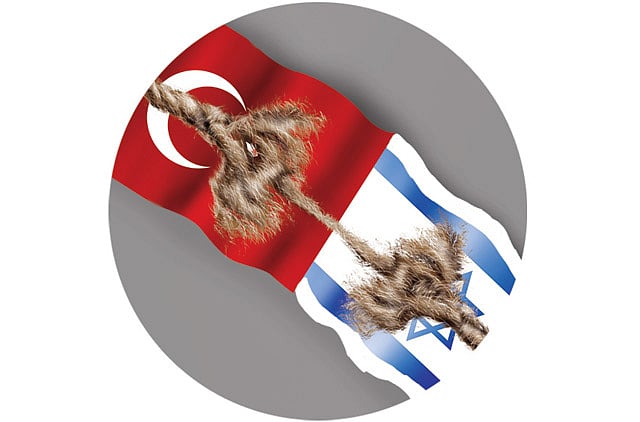It has been more than a month since the Israeli army stormed the Freedom Flotilla headed to break the siege on Gaza, killing eight Turkish citizens and infuriating Turkey's strong-minded Prime Minister Recep Tayyip Erdogan.
The fact that Israel's ambassador to Turkey has not been recalled and that a meeting took place between an Israeli and Turkish officials in Brussels last week, are by no means adequate indicators that the storm is starting to pass. Erdogan is still very angry with what happened. His Israeli counterpart Benjamin Netanyahu is still seemingly unconvinced of the need to bend in order to shelter his country from Turkish wrath. Between an angry Turkish Prime Minister and a stubborn Israeli one, relations seem far — very far — from a real rapprochement.
Netanyahu put it bluntly when speaking to Israeli TV last week: "Israel cannot apologise because its soldiers had to defend themselves to avoid being lynched by a crowd." His remarks came only two days after his Trade Minister, Benjamin Ben Eliezer, met Turkish Foreign Minister Ahmet Davutoglu in Brussels — a meeting called for by Israel, not Turkey. During that meeting, Davutoglu made it clear that a page will not be turned before Israel apologises for the flotilla attack and pays compensation for the families of the victims. He also demanded an international inquiry into the raid — a request that has already been frowned upon by US President Barack Obama, and by Netanyahu himself.
Defiant attitude
Not only is Tev Aviv unwilling to pay compensation, accept responsibility for the attack, or set up an independent investigation into the crime, but it is also adamant that its troops committed no wrong off the shores of Gaza last May.
It is clear that Netanyahu is not alone in his stance towards Turkey. Heading the hardliners is Foreign Minister Avigdor Lieberman, who is furious that the Brussels meeting took place without his knowledge.
Lieberman had famously raged when the passengers onboard the flotilla were released from Israeli custody without trial, under orders from Defence Minister Ehud Barak. He single-handedly is responsible for a diplomatic row with Turkey, prior to the flotilla incident, resulting from a public insult of Turkey's ambassador to Israel by his Deputy, Danny Ayalon.
Despite all of the above, Middle East analysts in the West are still busy debating how damaging the flotilla event was on Turkish-Israeli relations.
Realists claim that they already have hit rock bottom — especially after Turkey withdrew its ambassador on May 31 — and have reached the point of no return. Others claim that from where things stand today, the only way left for bilateral relations to go is up, arguing that war — as some wishful Arab journalists predicted — was simply, on nobody's agenda.
Some in Israel, like Alon Liel, who for many years served as his country's ambassador to Turkey, are nevertheless very worried. Liel spoke shortly after the incident saying: "They have already called the Turkish ambassador back to Ankara. I hope very much that this incident will not lead to breaking the diplomatic link."
As far as the Turks are concerned, there is a basket of solutions that can come out of talks, the most important being:
1) Israel can lift the siege over Gaza, as Turkey has been loudly calling for since the war of 2008.
2) The Israeli government can shoulder full responsibility for its mistake, apologise, compensate victims and accept international investigation into the flotilla affair.
3) It can show goodwill towards Turkey through accepting Turkey's role in the Middle East peace process, especially on the Syrian track which was called off by the Syrians in 2008 because of the war on Gaza.
It is up to the wise men in Israel — if there are any left — to realise the folly of being on the bad side of Turkey and pressure Netanyahu and his foreign minister into a change of policy; before it is too late.
Those who realise how important trade, for example, has been between both countries are pushing in this direction from within the Israeli business community. Bilateral trade between the countries reached $2.5 billion (Dh9.19 billion) in 2009. Additionally, sources in Turkey are now saying that their government is no longer interested in extending the Russian Blue Stream pipeline, a major trans-Black Sea pipeline that carries natural gas from Russia to Turkey.
Simply put, trust has completely collapsed between Turkey and Israel. The Turks walked that extra mile by agreeing to the Brussels meeting—which so far has clearly amounted to nothing—but there are limits to Turkey's patience.
Sami Moubayed is editor-in-chief of Forward magazine in Syria.
Sign up for the Daily Briefing
Get the latest news and updates straight to your inbox
Network Links
GN StoreDownload our app
© Al Nisr Publishing LLC 2025. All rights reserved.
